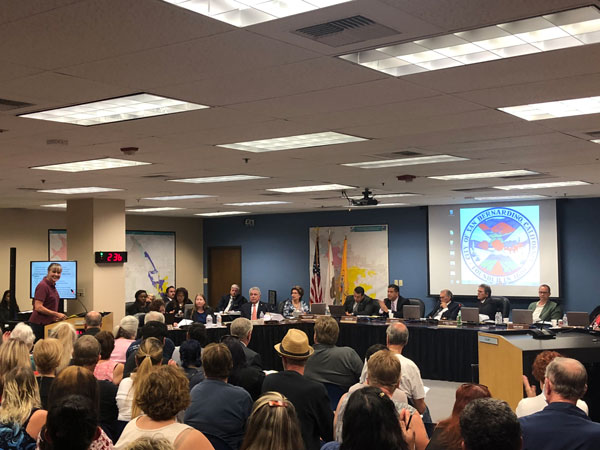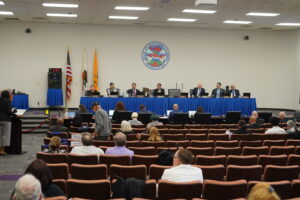San Bernardino Animal Shelter to remain open at least one more year
3 min read
Photo Sonny Michaels: The San Bernardino community showed up in full force to the Wednesday, June 20 council meeting to express their concerns over the city shutting down the animal shelter. Over 50 public comments were heard in support of keeping the shelter open.
During its regular session on Wednesday, July 20, San Bernardino City Council voted unanimously to extend the San Bernardino Animal Shelter’s operating budget for one year.
The alternative was to shut down the city’s animal shelter and contract with Riverside County to provide shelter, field and licensing services; the 200 – plus community stakeholders that showed up left the council meeting with hope.
“I suggest that we put forward this for continuance to a future date and remand it to the animal commission for further study,” proposed San Bernardino Mayor Carey Davis, who recommended a study time of six months to which the entire crowd began to chant, “One year.”
Councilman Henry Nickel made a motion to extend the study time for one year.
“Tonight we saw an army come out and show that our animal shelter is not only working, but it’s succeeding. We have a great opportunity to show how San Bernardino can work, thrive, and succeed,” said Nickel.
He also asked the crowd to continue to work together and stay in contact with one another until the issue is resolved.
“I’m going to put forward a motion that we extend the study time for one year. Second, I would like to see this come back in six months so we get an update on opportunities for outside funding,” continued Nickel.
Over 50 stakeholders spoke during the two-hour public comment portion of the meeting to voice their concerns, share their anger and even tears, in front of the council and city staff.
“(Shutting down the shelter) is a big blow to public safety. It’ll increase stray and aggressive animals, the likelihood of dog bites and traffic hazards will increase,” said San Bernardino resident Joshua Stevens. It’ll decrease the likelihood that a family can redeem an animal. It truly adds a significant burden for working class families with transportation and time constraints.”
Stevens added that without an animal shelter in San Bernardino animals would become more disposable because there would be no active spay or neuter program in the city.
“City Council thinking about building a shopping center instead of keeping the animal shelter is wrong, they need to look into other resources, instead of euthanizing helpless animals,” said Tabatha McGraw, San Bernardino resident.
Not only did community members in San Bernardino show up to the meeting, but many individuals from across Southern California showed up to support the animal shelter.
“It would be a disservice to the community to not have an animal shelter working within city limits. It will exacerbate the [existing] homeless pet population,” expressed Ylsa Tellez, Pasadena resident. “The Mayor and City Council should look into cannabis revenue that will be generated within the city to find funding resources, since they’re allowing taxable revenue on cannabis. It would be useful to this cause.”
A woman in attendance expressed her frustration on how the city of San Bernardino is “throwing away money.”
“Why are they spending $800,000 on employees? They recently spent a ton of money on hybrid vehicles for city employees; they also allocated $25,000 to rent a stage for a music festival that none of us have ever heard of,” said San Bernardino resident Linda Chalk.
Chalk said that she’s well aware of how inhumane other local animal shelters euthanize animals. She even went as far to say she witnessed a bird getting stabbed in the heart with a long needle at one of the other local animal shelter that she didn’t want to name.
“There’s a major health risk in this, we need animal control because cities like Montebello and Hawthorne have seen an increase in disease and cost to the cities in litigation, because cities should know they have to protect citizens against disease and animal issues. When they do not provide the correct service, they are liable,” said Chalk.
According to the city staff report, the projected annual operating cost associated with contracting with RCDAS for shelter, field and licensing services less the anticipated licensing revenue is $1,580,759 which is $538,545 less than it would cost the City of San Bernardino to provide the same level of service.
“There may be a financial savings, but it’s not significant; the city will only be saving just over $500,000 a year,” concluded Stevens.
By Sonny Michaels




